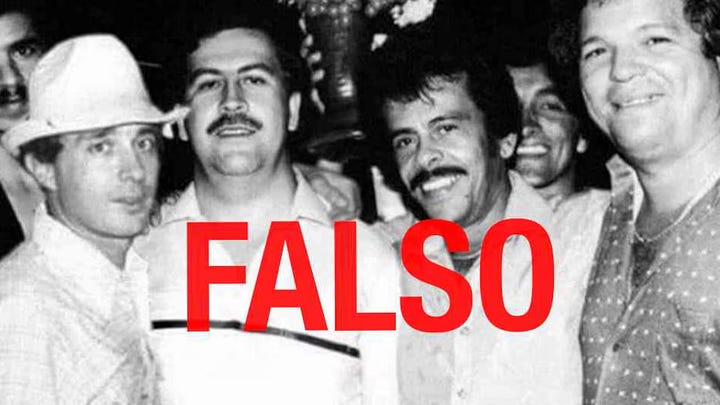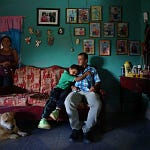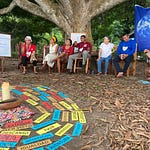Today, a brand-new, full-length podcast interview: tackling disinformation with two of Colombia’s leading experts. This week, Richard McColl and I spoke to José Sarmiento, Director of ColombiaCheck, and Laura Sanabria, who leads the Silla Vacía’s ‘Lie Detector.’
The creation and distribution of falsehoods and fabrications is a profound and global problem with serious implications for our decision-making - both personal and societal. As Meta fires its fact-checkers and hopes of regulation wane, the issue is only going to become more urgent. More than ever, we need a critical eye on our content.
José and Laura told us how (and whether!) Colombia is coping, and what the future looks like from the frontlines of the fight for information… Listen right here on my Substack or via Spotify - link below!
“Falsehood flies, and truth comes limping after it”
Jonathan Swift
Written three hundred years ago and halfway across the world, Swift’s words ring truer than ever: social media and messaging apps now give sensationalist half-truths and AI-doctored images wings to fly - further and faster than at any time in human history.
In Colombia, 94% of the adult population uses social media - mostly TikTok, Facebook, and Instagram. The reach of these platforms grew by millions of people in the last year alone and the average Colombian user now spends three and a half hours per day on these applications - the fourth-highest figure in the world.
Disinformation, stigmatisation, polarisation, and misogyny are rife across the ‘feeds’ of these platforms: whatever moderation processes might exist (and we still have very little clarity) are dictated far from Colombia, and then implemented on a huge scale - usually automated and without human review or local nuance.
Nonetheless, Colombian citizens (like citizens everywhere) continue to seek and consume news and information via social media platforms and WhatsApp groups.


Colombia’s political context - particularly when it comes to security - is uniquely complex. Disinformation has very real effects in this highly-sensitive so-called ‘post-conflict’ environment and the extremely precarious situations in which many activists and journalists work.
Polarisation continues to characterise the country’s political debate, and technology to alter images and videos is developing at an alarming pace: not only is disinformation easier to create, it’s harder to spot - and there is often a lot to be gained from getting away with it.
In this podcast, Laura and José tell us about their most important and controversial fact-checks (including topless presidential photos and extramarital affairs), and explain what drives the creation of fake news in Colombia. They also tell us how the pollution of the information environment affects elections, discrimination, and political polarisation - as well as how it influences the ongoing fight for historical justice and memory in the wake of half a century of civil conflict.
“We have a very particular president right now. At the Silla Vacía we have a joke that Petro hates us, but reads us every day. It’s funny - every week he responds to or re-posts our stories - but we do think he respects us. He threatens other journalists and media, but he doesn’t attack us in the same way,” says Laura.
Laura and José also tell us about their process - how they select and fact-check viral content and what tools they use - from the high-tech to the traditional - and where the limits of that work lie. We cover all the biggest (and fakest) stories from the last few months, and discuss how the problem is morphing under the influence of artificial intelligence and recent political shifts in the United States.
So if it is true, as Swift said, that ‘truth comes limping after’ - how far behind are we? And how can we hope to catch up?
José and Laura are truly in a David-and-Goliath fight, with small teams and limited resources, but they are optimistic, and tell us how we can move forward and face these challenges to our information, our democracies, and our societies.
“It’s a very risky moment - but I’d say there are a lot of options and opportunities to educate people. The situation is hard - we can’t deny that - but I also think we have, or can build, the tools to fight this phenomenon,” José told us.
Fact-checking tools by ColombiaCheck and the ‘Lie Detector’
This week’s interview is also available on Spotify and Apple - and wherever else you get your podcasts!
And for more, check out these podcasts I made last year for think tank Article 19 about Colombia’s information environment, social media’s contributions to conflict, and the human rights implications of the global failure to regulate Big Tech:
More of my podcast work with Colombia Calling here:
If you enjoy my podcast work, see more here on my Substack!
And finally… Are you signed up to the Colombia Briefing yet?
🗞️ Colombia’s headlines in English - every Monday as audio and text - tuning out the noise & cutting through the clutter to get you the week’s top stories.
🗞️ No ads or promos, no fluff, tabloid nonsense or gossip - just your need-to-know news, curated & digested.
🗞️ Every week, I read the full spectrum of news coverage - local and international, left-wing and right-wing - then I condense it all down to a five-minute briefing and send it out via Substack and WhatsApp - you can decide how you receive it!
🗞️ I do everything myself - no AI or ChatGPT summaries - definitely no creepy robot voices reading you your news - just me and a microphone - find more info and some clips here.
🗞️ All for a few $ per month - if you haven’t already, just upgrade to a paid subscription right here on Substack.
… And, of course, unsubscribe any time you like!



















Share this post